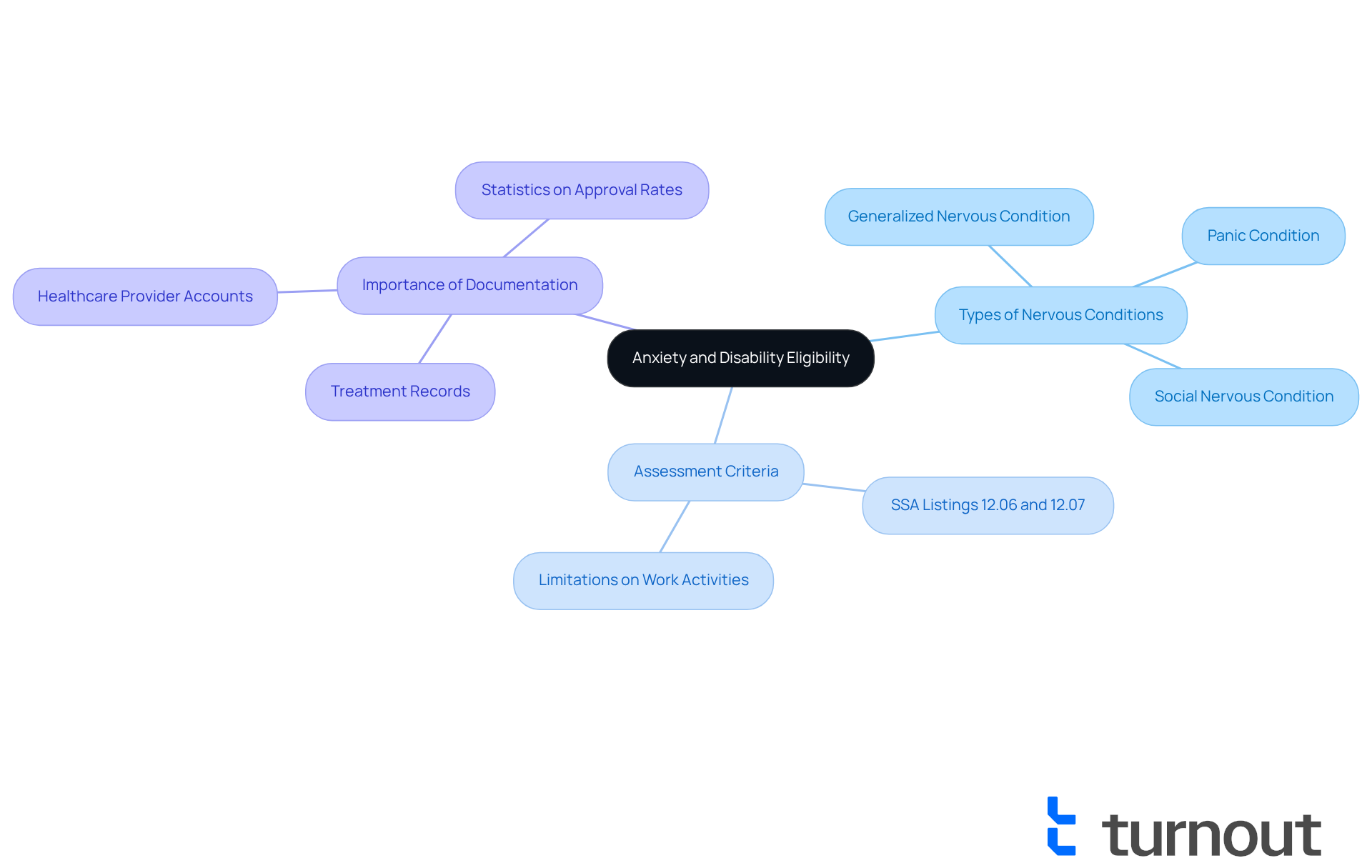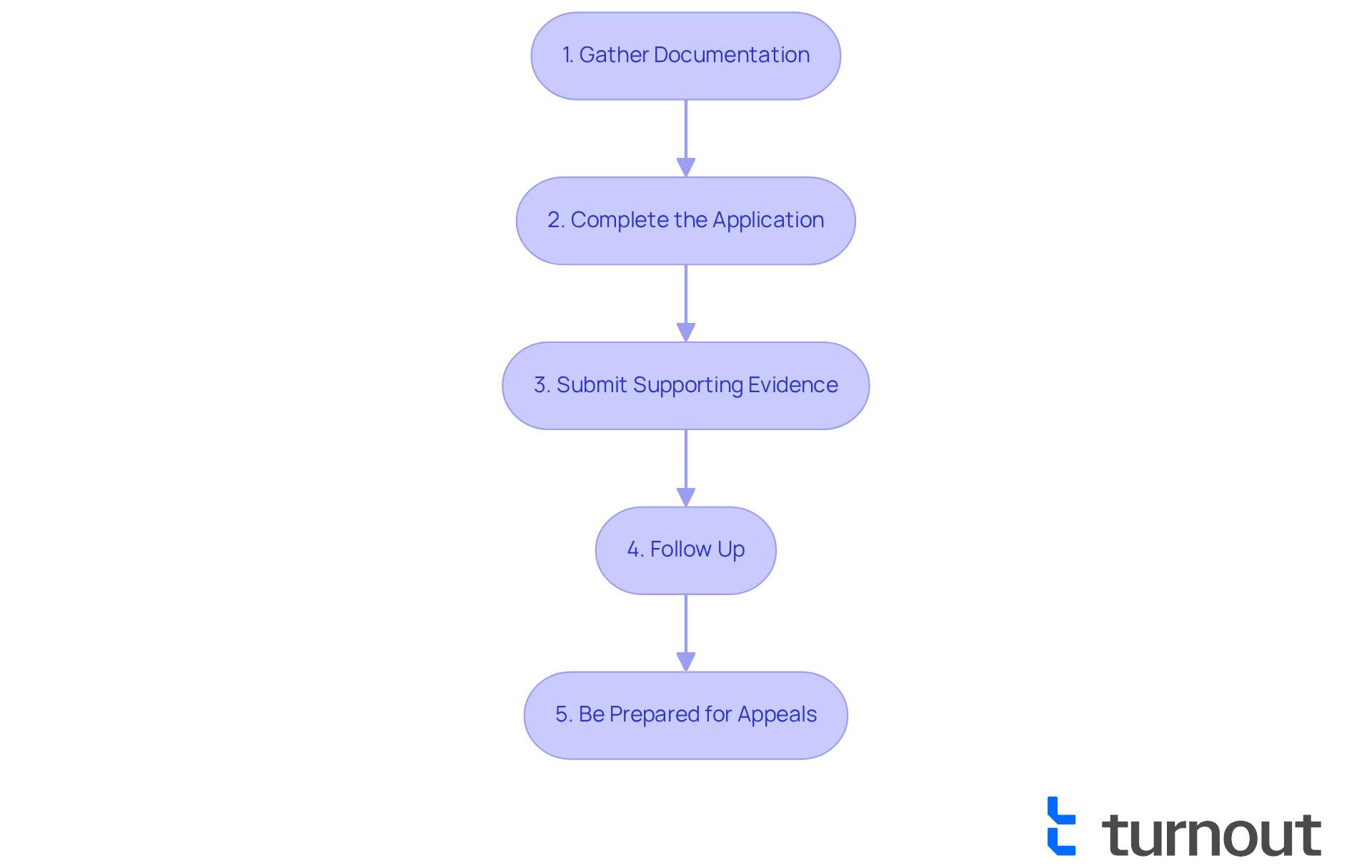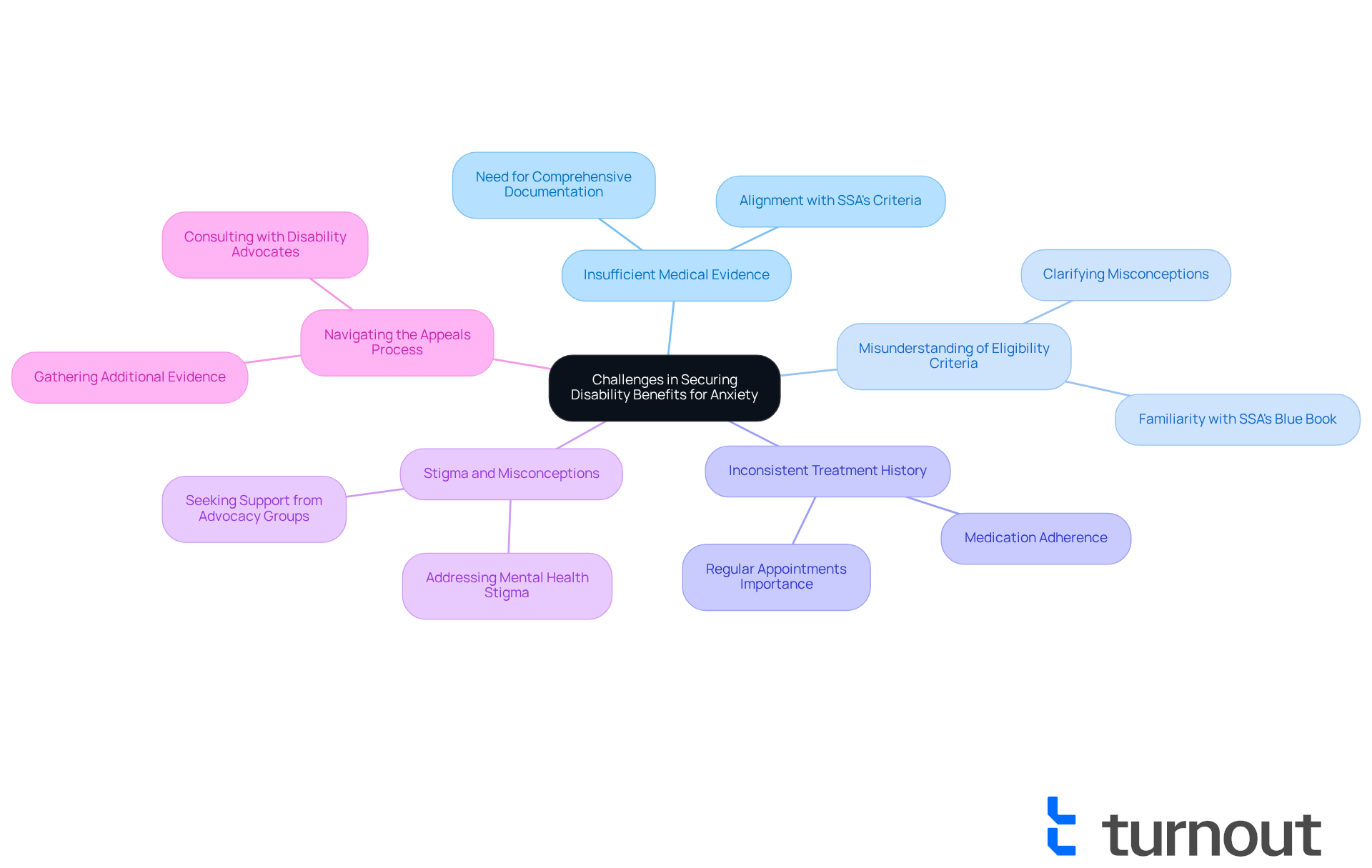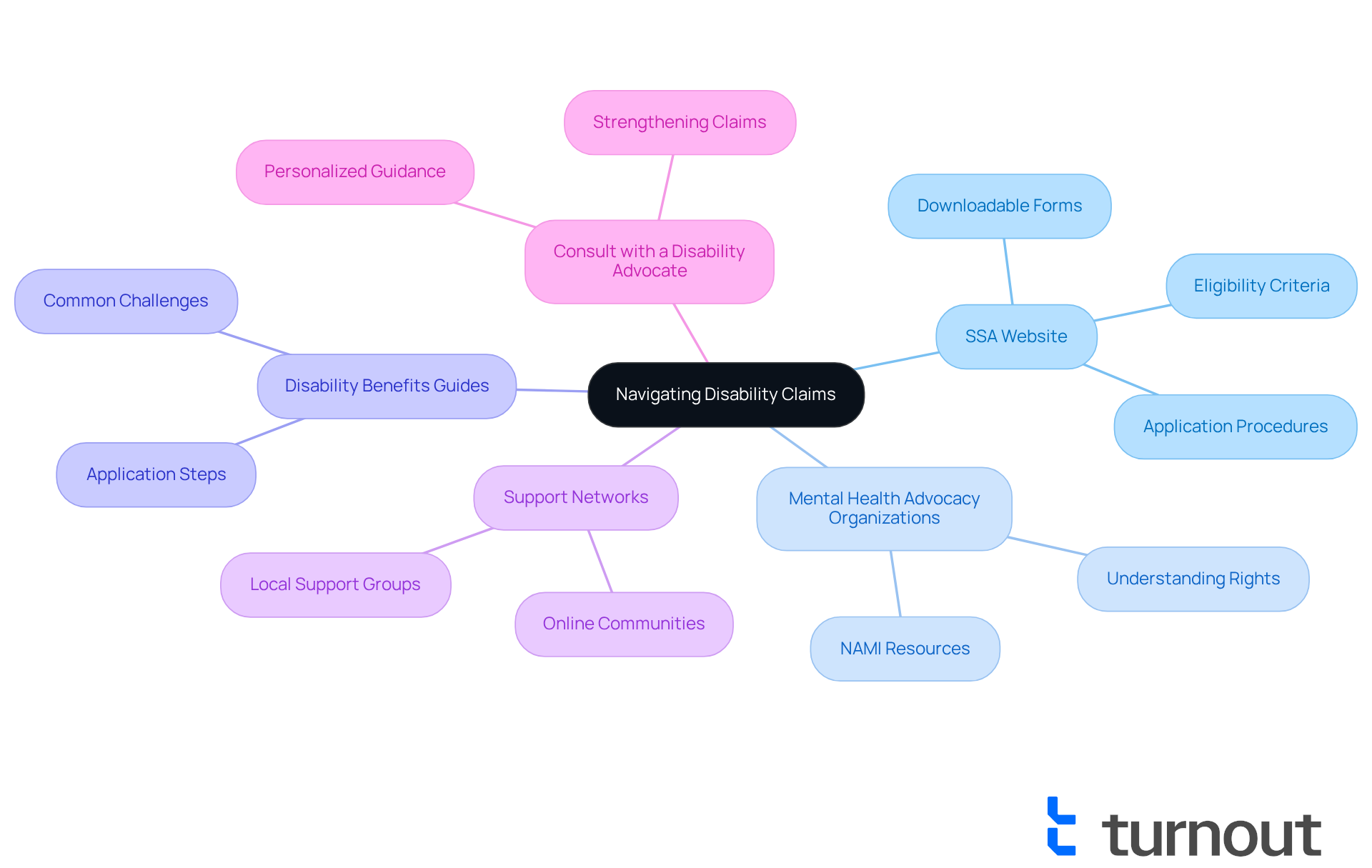Overview
If you are struggling with anxiety, you may qualify for disability benefits. This is possible if your condition significantly limits your ability to perform essential work activities, as outlined by the Social Security Administration's criteria.
We understand that navigating this process can be overwhelming. That's why it's crucial to have comprehensive medical documentation and to fully understand the application process.
Many claims are denied due to insufficient evidence or a misunderstanding of eligibility requirements. Remember, you are not alone in this journey. We're here to help you every step of the way.
Introduction
Anxiety disorders can significantly disrupt daily life, affecting everything from work performance to personal relationships. We understand that as you navigate the complexities of mental health, you might be wondering if securing disability benefits for anxiety is possible. This article aims to shed light on the application process, offering essential insights and practical steps to enhance your chances of approval.
It's common to feel overwhelmed, especially with statistics showing that nearly 60% of claims for mood or stress disorders are denied. So, what are the key factors that can turn the tide in your favor as you seek support for your anxiety-related challenges?
Understand Anxiety and Its Impact on Disability Eligibility
Nervous conditions, such as generalized nervous condition, panic condition, and social nervous condition, can deeply affect your daily life. We understand that navigating these challenges can be overwhelming. To qualify for disability benefits, it’s essential to understand how these conditions are assessed, particularly when considering if you can get disability for anxiety. The Social Security Administration (SSA) outlines criteria under listings 12.06 and 12.07, which state that your mental health issue must significantly limit your ability to perform essential work activities, like focusing, engaging with others, and managing stress.
Comprehensive documentation from healthcare providers detailing the severity and duration of your symptoms is crucial for establishing eligibility. Did you know that less than 40% of individuals with mood or stress disorders are approved for benefits? This statistic underscores the importance of thorough preparation. While Turnout is not a legal practice and does not provide legal counsel, we are here to support you in navigating the SSD application process effectively.
Our trained nonlawyer advocates can assist you in gathering the necessary documentation and understanding the requirements. Specific forms of evidence, such as consistent treatment records and detailed accounts from healthcare providers about how stress impacts your daily life, can strengthen your claims. It’s common to feel doubt due to the subjective nature of stress-related conditions. Therefore, presenting comprehensive medical documentation is vital to demonstrate how your condition affects your ability to maintain employment.
By familiarizing yourself with these criteria and seeking Turnout's assistance, you will be better prepared to determine if you can get disability for anxiety related to your mental health condition. Remember, you are not alone in this journey; we’re here to help you every step of the way.

Follow the Step-by-Step Application Process for Disability Benefits
While applying for disability benefits due to anxiety can feel overwhelming, you may wonder, can you get disability for anxiety? We're here to help you through each step of the process. Follow these steps to ensure you have the best chance of success:
-
Gather Documentation: Start by collecting comprehensive medical records, treatment history, and psychological evaluations that detail your condition related to anxiety. This documentation is essential, as many requests for anxiety disorders are rejected due to inadequate evidence. Turnout can help you understand which specific documents are needed to strengthen your case, ensuring you have the necessary support during this process.
-
Complete the Application: You can apply online through the SSA website or in person at your local SSA office. It's important to fill out all sections accurately, providing detailed information about your condition and its impact on your daily life. Remember, clarity and thoroughness are key to avoiding delays. Turnout's trained nonlawyer advocates can guide you through this process, helping to ensure that your application is as complete as possible. Please note that Turnout is not affiliated with any law firm or government agency, and our services do not constitute legal advice.
-
Submit Supporting Evidence: Include any additional documentation that supports your claim, such as letters from healthcare providers or therapists. This evidence can greatly enhance your application, especially if it illustrates how your anxiety affects your ability to work, raising the question of whether you can get disability for anxiety. As one supporter noted, "If you experience a mental health issue, it’s crucial to recognize that your situation can be as restrictive as any physical impairment." Turnout can assist you in identifying and compiling this supporting evidence effectively.
-
Follow Up: After submitting your application, keep track of its status. You may need to provide further information or attend a consultative examination if requested by the SSA. Staying proactive can help avoid unnecessary delays in processing your request. Turnout encourages clients to maintain communication with their advocates to ensure all requirements are met promptly.
-
Be Prepared for Appeals: If your application is denied, don’t be discouraged. Many initial claims are denied, particularly for anxiety disorders, leading to the question: can you get disability for anxiety, which can be challenging to prove. You have the right to appeal the decision. The appeals process includes Reconsideration, a Hearing by an Administrative Law Judge, Appeals Council Review, and potentially Federal Court. Gather additional evidence and consider seeking assistance from a consumer advocate, like those at Turnout, to strengthen your case. Persistence is crucial; the appeals process can take months or even years, but many individuals successfully secure benefits through this route. Remember, you are not alone in this journey.

Address Common Challenges in Securing Disability Benefits for Anxiety
Securing disability benefits for anxiety can feel overwhelming, and it's important to acknowledge the challenges you may face:
-
Insufficient Medical Evidence: Many claims are denied due to a lack of comprehensive medical documentation. It's crucial to ensure that your healthcare provider offers detailed reports on your condition and its impact on your daily life. Claims may be denied if documentation doesn’t align with the SSA's criteria, which require evidence of ongoing treatment and the severity of symptoms.
-
Misunderstanding of Eligibility Criteria: It's common to misinterpret the SSA's standards for mental health disorders. Familiarizing yourself with the specific listings in the SSA's Blue Book can help ensure your application aligns with these requirements. Many individuals seeking benefits for anxiety do not fully understand if they can get disability for anxiety, which can lead to unnecessary denials.
-
Inconsistent Treatment History: Gaps in treatment or inconsistent medication adherence can raise red flags during the assessment. Maintaining regular appointments with your healthcare provider and following their treatment recommendations is essential. Inconsistent treatment records can lead to the belief that the condition is neither serious nor persistent, making your application more difficult.
-
Stigma and Misconceptions: The stigma surrounding mental health can lead to self-doubt among applicants. Remember, anxiety disorders are legitimate medical conditions, leading to the question: can you get disability for anxiety? Seeking support from advocacy groups or mental health professionals can bolster your confidence and provide guidance throughout the process.
-
Navigating the Appeals Process: If your request is denied, know that many applicants encounter this obstacle. Gathering additional evidence and consulting with a disability advocate can significantly improve your chances of success. Turnout offers access to skilled nonlegal advocates who can assist you in managing the intricacies of SSD applications. Please note that Turnout is not a law firm and does not provide legal representation. Additionally, for tax debt relief, Turnout works with IRS-licensed enrolled agents. Filing your appeal promptly is crucial, as delays can further complicate your situation.
By proactively addressing these challenges and utilizing resources like Turnout's advocacy services, you can enhance your chances of securing the benefits you deserve. Remember, you are not alone in this journey, and we're here to help.

Utilize Resources and Tools for Effective Navigation of Disability Claims
Navigating the disability claims process can feel overwhelming, especially when considering if you can get disability for anxiety, but you’re not alone. Here are some resources that can provide the support you need:
-
Social Security Administration (SSA) Website: The SSA website is a vital starting point, offering detailed information on eligibility criteria, application procedures, and downloadable forms that can guide you through the process.
-
Mental Health Advocacy Organizations: Organizations like the National Alliance on Mental Illness (NAMI) offer valuable resources and support networks. They can help you understand your rights and options regarding whether you can get disability for anxiety during this challenging journey.
-
Disability Benefits Guides: Numerous online resources and publications outline the application steps and common challenges. Trustworthy websites, including the SSA and mental health advocacy organizations, provide strategies to navigate the process effectively.
-
Support Networks: Connecting with online communities or local support groups can be incredibly beneficial. Sharing experiences and advice with others who are on a similar path can provide both emotional support and practical tips.
-
Consult with a Disability Advocate: If you’re feeling overwhelmed, reaching out to a disability advocate can make a significant difference. They offer personalized guidance and support throughout your application process, ensuring you have the resources and information needed to strengthen your claim.
Remember, seeking assistance is a courageous step, and there are people and resources ready to support you every step of the way.

Conclusion
Navigating the process of securing disability benefits for anxiety can indeed feel overwhelming. We understand that anxiety disorders, such as generalized anxiety disorder and panic disorder, can deeply affect daily functioning. It's essential to establish a clear connection between your condition and its impact on work-related activities. With the right documentation and support, you can better position yourself to qualify for benefits.
Key insights from the article highlight the importance of:
- Comprehensive medical evidence
- An accurate application process
- Proactively managing potential challenges
Insufficient documentation, misunderstandings of eligibility criteria, and the stigma surrounding mental health issues can hinder your progress. However, by gathering thorough records, seeking assistance from advocacy organizations, and understanding the appeals process, you can significantly improve your chances of success.
Ultimately, securing disability benefits for anxiety is not just about navigating red tape; it's about recognizing the legitimate struggles faced by those with mental health conditions. Embracing available resources, such as the SSA website and support networks, can empower you to advocate for your rights. Remember, taking action and seeking help is a vital step toward achieving the support you need to manage anxiety and its impact on your everyday life.
Frequently Asked Questions
What types of nervous conditions can affect disability eligibility?
Nervous conditions such as generalized nervous condition, panic condition, and social nervous condition can significantly impact daily life and disability eligibility.
How does the Social Security Administration (SSA) assess anxiety for disability benefits?
The SSA assesses anxiety under listings 12.06 and 12.07, requiring that the mental health issue significantly limits the ability to perform essential work activities, such as focusing, engaging with others, and managing stress.
What documentation is needed to qualify for disability benefits due to anxiety?
Comprehensive documentation from healthcare providers detailing the severity and duration of symptoms is crucial for establishing eligibility. This includes consistent treatment records and detailed accounts from healthcare providers about how stress impacts daily life.
What is the approval rate for individuals with mood or stress disorders seeking disability benefits?
Less than 40% of individuals with mood or stress disorders are approved for benefits, highlighting the importance of thorough preparation and documentation.
Can Turnout assist in the SSD application process?
Yes, Turnout provides support in navigating the SSD application process, including assistance in gathering necessary documentation and understanding requirements, although it does not offer legal counsel.
Why is comprehensive medical documentation important for anxiety-related disability claims?
Comprehensive medical documentation is vital to demonstrate how the condition affects the ability to maintain employment, especially due to the subjective nature of stress-related conditions.
How can individuals prepare to determine if they can get disability for anxiety?
Familiarizing oneself with SSA criteria and seeking assistance from organizations like Turnout can help individuals prepare and understand their eligibility for disability benefits related to anxiety.




